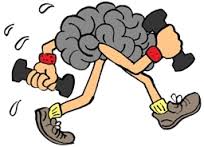 We most often think about exercise as a way to work off the calories that we may have consumed, or some of us know that endorphins are our friends as we get that “ahhh feeling” after a workout. Evidently not all of Americans have read the memo, because the latest government numbers show that 42.4% of us are obese, up 26 percent since even 2008.
We most often think about exercise as a way to work off the calories that we may have consumed, or some of us know that endorphins are our friends as we get that “ahhh feeling” after a workout. Evidently not all of Americans have read the memo, because the latest government numbers show that 42.4% of us are obese, up 26 percent since even 2008.
Well, researchers have determined that there is at least one more great reason to keep working out…regular physical activity offer us overall protection from dementia. This is not just “one new study” syndrome. In at least three big long term studies which followed many thousands of people for years, physical activity has reduced the risk of developing dementia even in families with a history of dementia.
In one study using British data scientists followed over half a million adults regularly collecting a host of specific data on people’s sports activities, rigorous workouts and even housekeeping chores. These individuals were followed for 11 years and a bit over one percent did develop dementia, but physical activity reduced the chance of being diagnosed with dementia by 35 percent. There was a reduced dementia risk even among people with a family history of cognitive issues. (Read More)
In another piece of research that came out this month, scientists reviewed 38 individual pieces of research following over two million people in what is termed a “meta-analysis.” With this many studies, the variety of “exercises” tested was extensive, but the results were similar to the first study. The average risk reduction for dementia was 17 percent across the 38 studies. The researchers concluded that it seems we can do whatever exercise we like and there will be a cognitive health benefit. (Read More)
You may question why the short time frame for following subjects? In another study, researchers followed children between seven and fifteen years of age for more than three decades. They were not looking for dementia diagnoses for such young cohorts, but they did measure cognitive function in midlife, and those young adults who registered higher cognitive performance in midlife also had the strong fitness records through the three decades leading to the last measurement. (Read More)
So, think about exercise in a much broader way. It isn’t just running marathon’s or bench-pressing your own weight at the gym or how many laps you swim. It’s the sum total of all the regular exertion you afford your body, because it isn’t just the muscles you work out that benefit from your exertion. Your brain that lives in the same body as your muscles gets a real boost as well. It’s never too late to start some regular mental fitness workouts.
Charlotte Bishop is an Aging Life Care Advisor, Geriatric Care Manager and founder of, certified professionals who are geriatric advocates, resources, counselors and friends to older adults and their families in metropolitan Chicago. She also is the co-author of How Do I Know You? A Caregiver’s Lifesaver for Dealing with Dementia.






